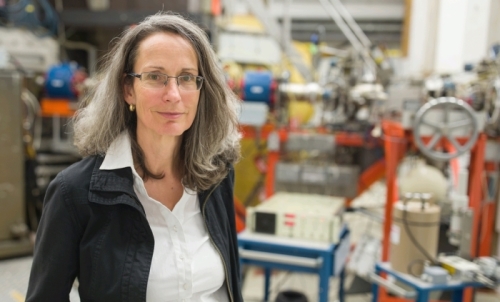Andrea Denker is Professor of "Accelerator Physics for Medicine"

Prof. Dr. Andrea Denker is the head of the department "Proton Therapy" at HZB. © HZB/ M. Setzpfandt
The Beuth Hochschule für Technik Berlin and the Helmholtz-Zentrum Berlin (HZB) have appointed Prof. Dr. Andrea Denker to the joint professorship "Accelerator Physics for Medicine" as of October 1, 2018. Since 2006, Andrea Denker is head of the department "Proton Therapy" at the HZB, which operates the accelerator for eye tumor therapy. The therapy, offered in cooperation with the Charité - Universitätsmedizin Berlin and the HZB, is unique in Germany.
As part of her professorship, Andrea Denker is taking on lectures in the "Physical Technology - Medical Physics" course at Beuth University. In the current winter semester she offers the lecture "Atomic and Nuclear Physics" for Bachelor students.
Even before her appointment, Andrea Denker was a lecturer at the university. "I enjoy this job very much and the contact with the students is very enriching for me and my team at HZB," says Denker. The appointment now creates an even closer connection to the university. "We are already looking forward to many interesting theses that will be written at the proton accelerator at the HZB.
Andrea Denker studied and received her doctorate in physics at the University of Stuttgart. Then she worked at the CSNSM (Centre de Sciences Nucléaires et de Sciences de la Matière) in Orsay, France. In 1995 Andrea Denker started as a scientist at the ion accelerator ISL. Among other things, she calculated and developed the beam parameters for eye tumor therapy, which was launched 20 years ago.
(sz)
https://www.helmholtz-berlin.de/pubbin/news_seite?nid=14955;sprache=en
- Copy link
-
Element cobalt exhibits surprising properties
The element cobalt is considered a typical ferromagnet with no further secrets. However, an international team led by HZB researcher Dr. Jaime Sánchez-Barriga has now uncovered complex topological features in its electronic structure. Spin-resolved measurements of the band structure (spin-ARPES) at BESSY II revealed entangled energy bands that cross each other along extended paths in specific crystallographic directions, even at room temperature. As a result, cobalt can be considered as a highly tunable and unexpectedly rich topological platform, opening new perspectives for exploiting magnetic topological states in future information technologies.
-
Bernd Rech elected to the BR50 Board of Directors
The Scientific Director at Helmholt-Zentrum Berlin is the new face behind the "Natural Sciences" unit at Berlin Research 50 (BR50). Following the election in December 2025, the constituent meeting of the new BR50 Board of Directors took place on 22 January 2026.
Its members are Michael Hintermüller (Weierstrass Institute, WIAS), Noa K. Ha (German Centre for Integration and Migration Research, DeZIM), Volker Haucke (Leibniz Research Institute for Molecular Pharmacology, FMP), Uta Bielfeldt (German Rheumatism Research Centre Berlin, DRFZ) and Bernd Rech (HZB).
-
AI re-examines dinosaur footprints
For decades, paleontologists have pondered over mysterious three-toed dinosaur footprints. Were they left by fierce carnivores, gentle plant-eaters, or even early birds? Now, an international team has used artificial intelligence to tackle the problem—creating a free app that readily lets anyone decipher the past.
